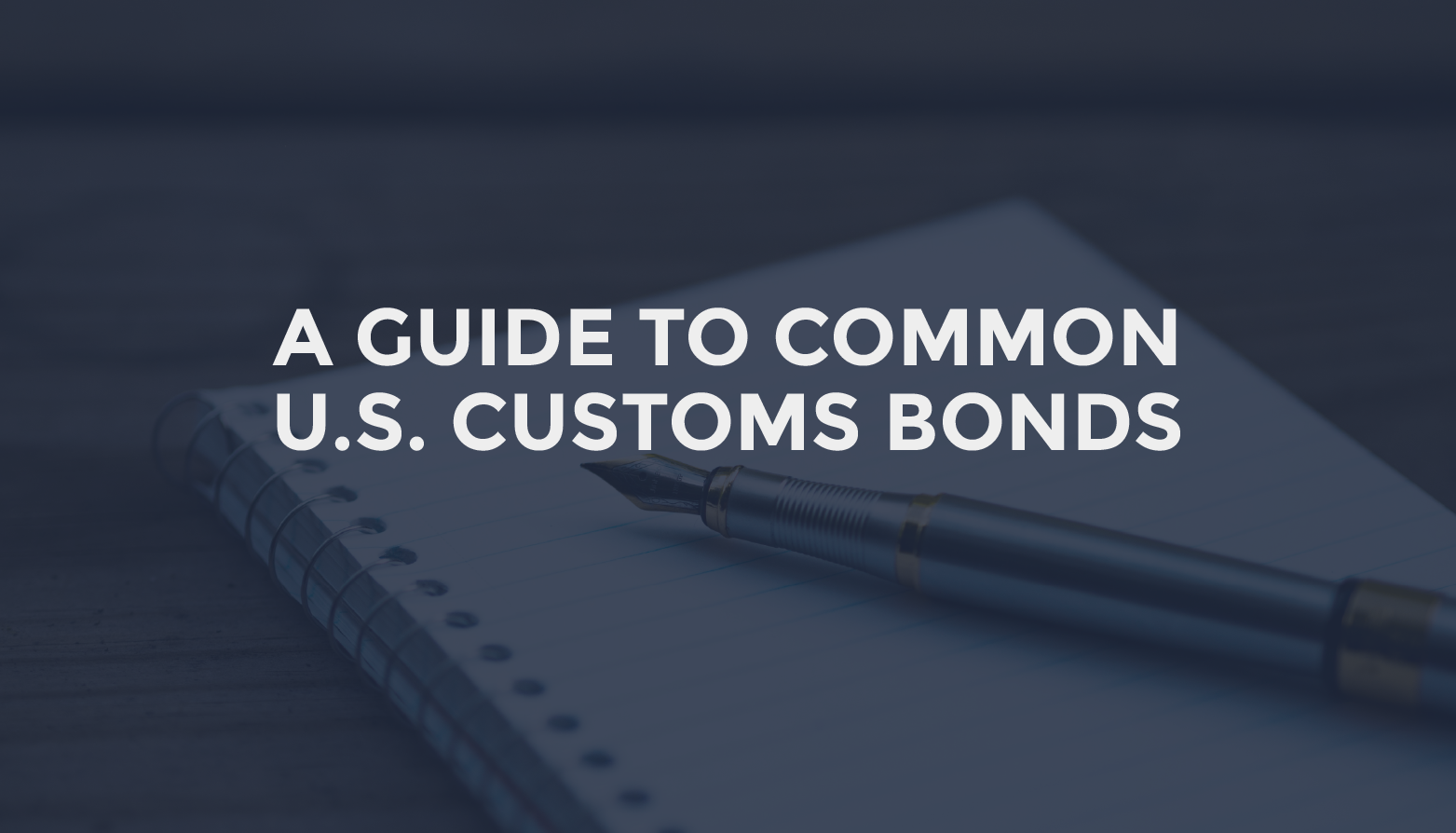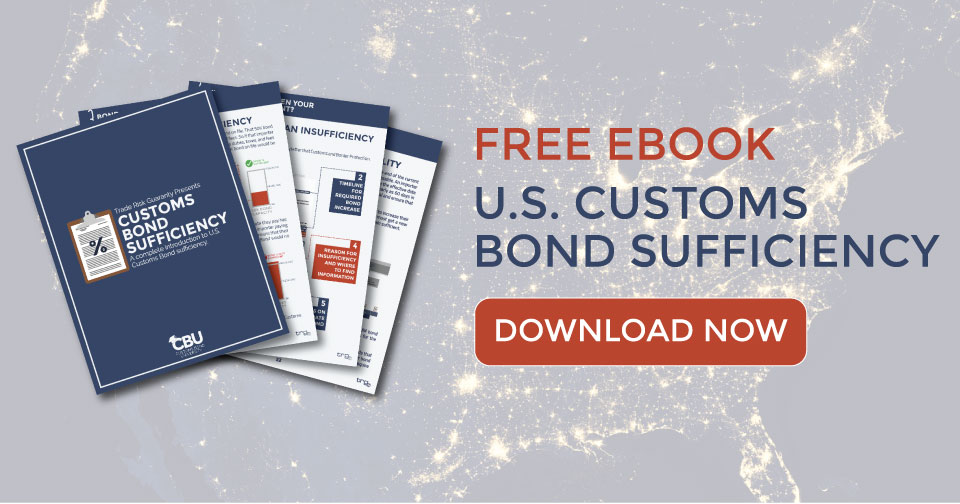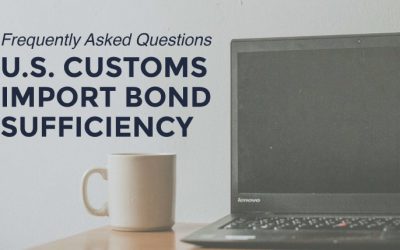Refresh your knowledge and learn the basics of the common U.S. Customs Bonds needed when importing into the United States.
If you’re involved in the world of importing, you’ve likely encountered the term “Customs bonds.” But what exactly are Customs bonds, and why are they essential for importers? In this guide, we’ll demystify Customs bonds and explore the most common types you might encounter in your importing journey.
Understanding Customs Bonds: The Quick Basics
At its core, a Customs bond is a contract between various parties involved in the importing process. These contracts serve as financial guarantees to ensure that importers comply with Customs regulations set by U.S. Customs and Border Protection (CBP) and other federal agencies. In other words, Customs bonds are like a promise to follow the rules.
Customs bonds are necessary under these circumstances:
- Commercial Imports Valued at $2,500 or More:
If your imported goods are valued at $2,500 or above, you’ll typically need a Customs bond. This rule applies to many standard commercial imports. - Regulation by Other Federal Agencies:
Some imports fall under the jurisdiction of specific federal agencies beyond CBP. In these cases, a Customs bond may also be required to ensure compliance. - Companies that that require Customs regulation to do business:
Companies who need Customs bonds may not be importing goods. For example, a janitorial service that works within a Customs secured area of an international airport will need to hold a C11 bond. Or, a trucking company that moves goods that have not yet cleared US Customs will need to hold a C2 bond.
Types of Customs Bonds
Now, let’s delve into the most common types of Customs bonds you might encounter:
Import Bond (Activity Code 1)
The Import Bond is your go-to bond for basic imports. It can be used for both single transactions and continuous imports over a year. Whether you’re bringing in a one-time shipment or regularly importing goods, the Import Bond ensures you’re following Customs rules.
More strategic details on Import Bonds.
Drawback Bond (Activity Code 1a)
Sometimes, imported goods aren’t exported immediately, but ultimately will not be staying in the US. In these instances, Drawback Bond comes into play. It can also be used for both single transactions and continuous imports. Importers may receive a refund on 99% of the duty taxes and fees when they eventually export the product.
More strategic details on Drawback Bonds.
Custodian of Bonded Merchandise (Activity Code 2)
Imagine your goods are held by a third party, like a warehouse, before they clear Customs. That’s where the Custodian of Bonded Merchandise Bond comes in. The bond is required by the third-party warehouse that is “holding” the goods prior to it being cleared by customers.
More strategic details on Custodian of Bonded Merchandise.
International Carrier Bond (Activity Code 3)
If you’re in the business of transporting goods, whether by vessel, vehicle, or aircraft, the International Carrier Bond is a must. It guarantees that you’ll follow entry regulations, manifest transported merchandise, and, importantly, it can be used for both single transactions and continuous transportation.
More strategic details on International Carrier Bonds.
Instruments of International Traffic Bond (Activity Code 3a)
When it comes to the movement of goods across international borders, the precise handling and clearance of shipping containers are of paramount importance. What sets the Instruments of International Traffic Bond apart is its dedicated focus on compliance with shipping container clearance regulations. Shipping containers are crucial vessels for transporting goods globally, and any lapses in compliance can lead to delays, fines, or even disruptions in the supply chain.
Foreign Trade Zone Operator Bond (Activity Code 4)
Foreign Trade Zones (FTZs) are areas inside the U.S. border but treated as a non-U.S. territory. The Foreign Trade Zone Operator Bond is crucial for creating and maintaining FTZs, as well as ensuring compliance with CBP guidelines.
More strategic details on Foreign Trade Zone Bonds.
Airport Security Bond (Activity Code 11)
The Airport Security Bond serves as a guarantee that all personnel permitted entry under the bond will adhere to CBP guidelines. It’s a term bond, meaning it can only be used on a specific date in the future when access is required. This bond ensures that everyone within the secured airport area follows the necessary regulations, contributing to the overall safety and security of airport operations.
More strategic details on Airport Security Bonds.
Choosing the Right Customs Bond
With these various types of Customs bonds, how do you know which one is right for your situation? The key is to consider the specifics of your imports. Different bonds suit different scenarios, so it’s essential to match the bond to your unique needs.
If you’re uncertain about which bond you require, consider consulting with TRG. We can provide expert advice tailored to your situation.
Customs bonds are an integral part of the importing process, ensuring compliance with Customs regulations and the smooth flow of goods across borders. By understanding the various types of Customs bonds and their purposes, you can navigate the world of U.S. Customs with confidence. Whether you’re a one-time importer or regularly deal with international shipments, there’s a Customs bond that fits your needs.





![[Webinar] How Could Changes to De Minimis Impact Your Company?](https://traderiskguaranty.com/trgpeak/wp-content/uploads/2025/05/trg-how-de-minimis-impacts-customs-bond-webinar-400x250.png)

